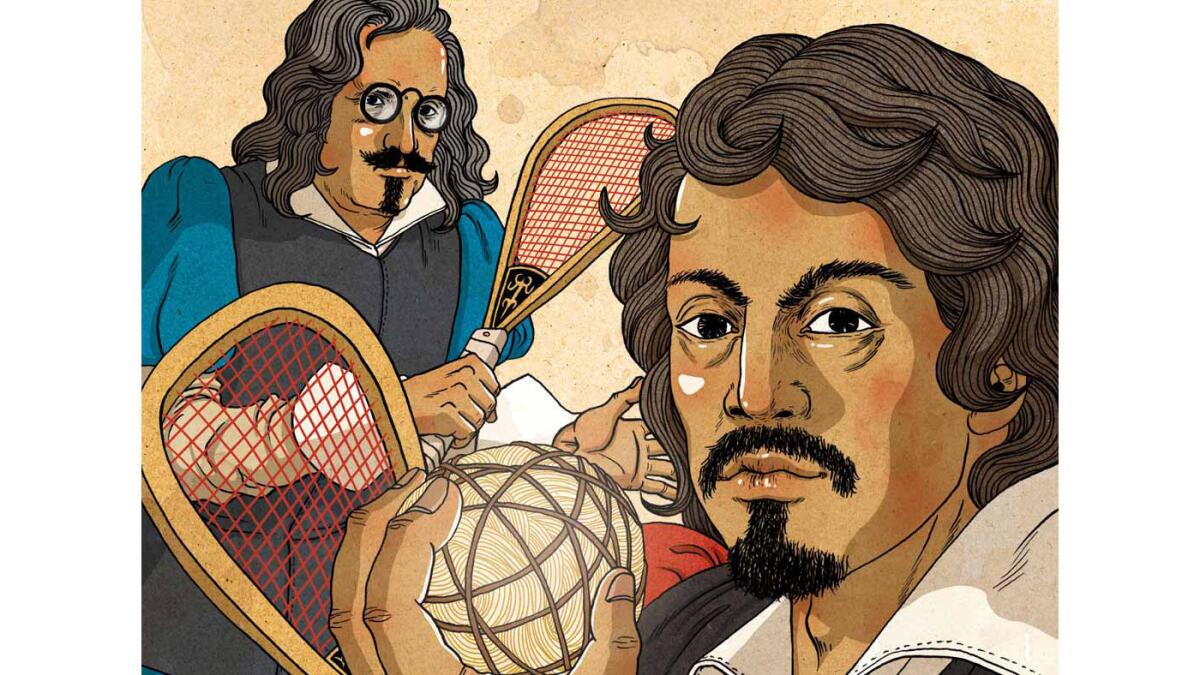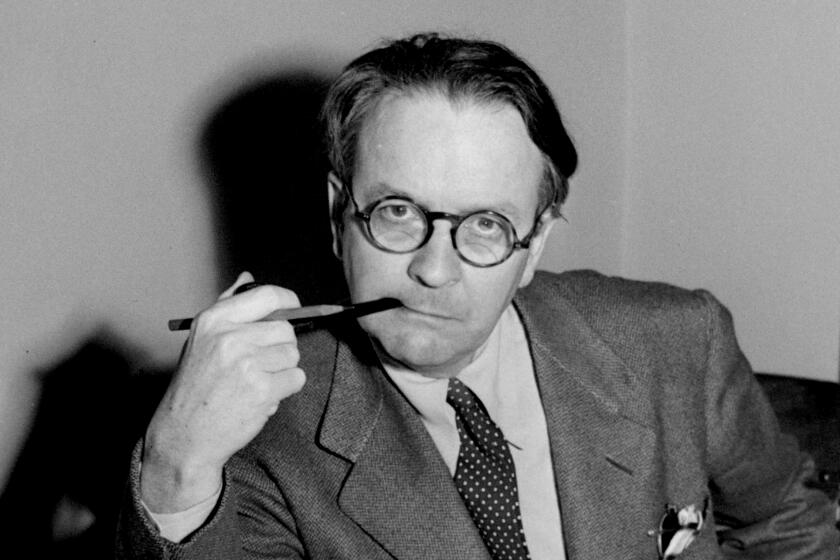Review: Aztec and European empires collide in the strange and bloody ‘Sudden Death’ by Álvaro Enrigue

Illustration to go with the review of the book “Sudden Death” by Alvaro Enrigue.
A small leather ball stuffed with the hair of a dead queen is batted back and forth by two of Europe’s most innovative artists. They’re hung over, Caravaggio probably still drunk; Quevedo, the Spanish poet, seeks victory to maintain his reputation in the eyes of his royal confidante. Across the world, Hernán Cortés, with the help of his indigenous translator, lover and advisor Malinalli, is bringing about a political and religious revolution. Meanwhile, popes and bankers vie for control of land, art and artifacts, their machinations and desires bringing forth a newly vicious historical era. “Never were the connections among politics, money, art, and semen so tight or so murky,” Enrigue writes. “Or so unashamedly happy, tolerant, and fluid.”
But change isn’t confined to church and state; “Sudden Death” is a novel of revolution in the spatial and historical sense of the word. The spin of a ball on a cobbled court in Rome circa 1600 seems to affect the transformation of Latin America begun decades earlier. A scapular, a miter, a tennis ball — objects that change hands simply to appease, charm and protect are simultaneously totems drenched in the bloody, intractable events that destroyed Aztec civilization. Enrigue, a Mexican writer living in New York City, writes precisely about the messy feedback loop between a culture’s atmosphere and its products.
Cortés’ sexual desire for Malinalli brings about “the greatest religious feat of all time”; Caravaggio’s love for his crew of lowlifes engenders painting’s modernity in its depiction of “a material humanity smelling of blood and saliva.” A muddy brawl, sex on a cape of feathers and the depiction of Mary Magdalene with a crooked finger become acts with more epochal power than tomes of teleological history.
Though portraying grand lives, Enrigue plays with the validity of hagiography. As he says in a later chapter, “Novels demolish monuments because all novels, even the most chaste, are a tiny bit pornographic.”
And structurally, “Sudden Death” isn’t normative: a short screenplay and the author’s emails are interspersed with short entries from obscure sporting dictionaries and excerpts from humanist classics. Chapters are short, enticing and written with a casual erudition that whispers to readers that, no matter the apparent surprises of the game, the author is in full control.
Enrigue muses on the nature of the novel and his intentions in writing “Sudden Death” as easily as he holds a candle to the obscure maneuvers of the powerful. And he has a poet’s ear, beautifully attended to by Natasha Wimmer’s translation; witness Galileo Galilei’s description of Caravaggio: “He found him at once brutal and vulnerable, fragile behind his armor of grease, grappa and cussedness.”
After detailing a comically lopsided and intentionally mistranslated exchange between Cortés and Moctezuma’s emissaries, Enrigue states, “There are few better illustrations of how a whole host of people can manage to understand absolutely nothing, act in an impulsive and idiotic way, and still drastically change the course of history.” Honest accounts of these moments evince the dishonesty in our attempts to make history neat.
“Sudden Death” shows us that games are never merely games, because no game is played without consequences — some of which then permanently clouding our ability to look back and understand the procession of bodies that enable our play, our culture.
Enrigue, enraptured by the stark colors of historical discovery, sees world-changing significance in too much. The phrase “that changed the world” occurs at least three times, with respect to an idea, a clitoris and a mistake. The idea that a material world can be changed in one stroke is too modern, too blockbuster, too much of an anachronism. It ignores the strangeness of the dead, the final opacity of the past and the flexibility with which human culture moves.
Yet Enrigue is no fool for simple tales: “Sudden Death” plucks the horizon-line tension between meaning and insignificance, order and chaos. We extinguish the carriers of gods who crave gore only to light the fire of a new god — money — which begins to demand everything from everyone.
In one thread of the book, an educated European attempts to better the lot of indigenous Mexicans by ordering them to re-create the satirical society of Thomas More’s “Utopia,” a fiction that apes the indigenous culture in place before the arrival of European “humanism” to Mexico. Another European, an archbishop who led many of the intolerant persecutions of the Counter-Reformation, is blamed for having destroyed “in a single generation the medical knowledge accumulated over thousands of years in central Mexico.”
One might adopt nihilism after confronting again and again “the pettiness and stupidity of those who believe that winning is all that matters,” but this potential for destructive myopia is matched point for point by meaning. As Enrigue writes, “history and stories alike offer the consolation of order,” and that “Sudden Death” is “a machine for understanding the world, or the ways in which we name the world.”
In Enrigue’s construction, every vulgar Caravaggio has his mystical counterpart in a Don Diego Huanitzin, a master feather-worker who seemed to take the conquering of his people and erasure of much of his culture in stride. The novel investigates “the true mystery of the forces that control how we inhabit the earth,” “elemental” mysteries that combine — and combust — in an ultimately joyous process of transformation, exultation. The novel functions as a “a parenthesis, a dyke, a moment of rest” from this chemical becoming — but a rest that nonetheless paints a world in which the past speaks to the future to challenge it, and us, to “see in a bigger way.”
Late in the novel, the Spanish humanist Quiroga sits by a lake with Huanitzin, the Nahua noble. They’re placidly high on mushrooms, staring into the lake and chatting through the visions. As the daylight fades, Quiroga notices the old gods “playing ball, indifferent to their extinction.” “Sudden Death” affirms the joys of play amid a drowning world.
So we play games with bits of our dead, using these talismans without reverence or even reflection. To play the game of engaging history in our imagination, we must stand and sweat, hung over from our perpetual night of naiveté and romance. Even if the game seems as clearly stated as “angels on one side, demons on the other,” we face ourselves — and “the good guys never win.”
Baumann is a writer, publisher and book designer living in Santa Fe, N.M.
::
Sudden Death
Álvaro Enrigue
Riverhead: 272 pp., $27
More to Read
Sign up for our Book Club newsletter
Get the latest news, events and more from the Los Angeles Times Book Club, and help us get L.A. reading and talking.
You may occasionally receive promotional content from the Los Angeles Times.








